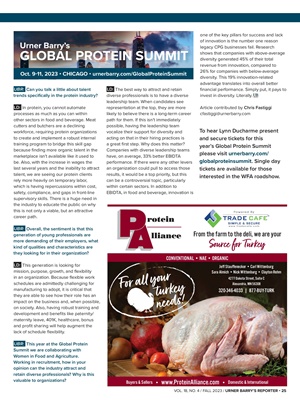
VOL. 18, NO. 4 / FALL 2023 / URNER BARRY'S REPORTER • 25
UBR: Can you talk a little about talent
trends specifically in the protein industry?
LD: In protein, you cannot automate
processes as much as you can within
other sectors in food and beverage. Meat
cutters and butchers are a declining
workforce, requiring protein organizations
to create and implement a robust internal
training program to bridge this skill gap
because finding more organic talent in the
marketplace isn't available like it used to
be. Also, with the increase in wages the
last several years and the inability to attract
talent, we are seeing our protein clients
rely more heavily on temporary labor,
which is having repercussions within cost,
safety, compliance, and gaps in front-line
supervisory skills. There is a huge need in
the industry to educate the public on why
this is not only a viable, but an attractive
career path.
UBR: Overall, the sentiment is that this
generation of young professionals are
more demanding of their employers, what
kind of qualities and characteristics are
they looking for in their organization?
LD: This generation is looking for
mission, purpose, growth, and flexibility
in an organization. Because flexible work
schedules are admittedly challenging for
manufacturing to adopt, it is critical that
they are able to see how their role has an
impact on the business and, when possible,
on society. Also, having robust training and
development and benefits like paternity/
maternity leave, 401K, healthcare, bonus
and profit sharing will help augment the
lack of schedule flexibility.
UBR: This year at the Global Protein
Summit we are collaborating with
Women in Food and Agriculture.
Working in recruitment, how in your
opinion can the industry attract and
retain diverse professionals? Why is this
valuable to organizations?
LD: The best way to attract and retain
diverse professionals is to have a diverse
leadership team. When candidates see
representation at the top, they are more
likely to believe there is a long-term career
path for them. If this isn't immediately
possible, having the leadership team
vocalize their support for diversity and
acting on that in their hiring practices is
a great first step. Why does this matter?
Companies with diverse leadership teams
have, on average, 33% better EBIDTA
performance. If there were any other levers
an organization could pull to access those
results, it would be a top priority, but this
can be a controversial topic, particularly
within certain sectors. In addition to
EBIDTA, in food and beverage, innovation is To hear Lynn Ducharme present
and secure tickets for this
year's Global Protein Summit
please visit urnerbarry.com/
globalproteinsummit. Single day
tickets are available for those
interested in the WFA roadshow.
one of the key pillars for success and lack
of innovation is the number one reason
legacy CPG businesses fail. Research
shows that companies with above-average
diversity generated 45% of their total
revenue from innovation, compared to
26% for companies with below-average
diversity. This 19% innovation-related
advantage translates into overall better
financial performance. Simply put, it pays to
invest in diversity. Literally.
Article contributed by Chris Fastiggi
cfastiggi@urnerbarry.com
Oct. 9-11, 2023 • CHICAGO • urnerbarry.com/GlobalProteinSummit
Jeff Stauffenecker • Carl Wittenburg
Sara Almich • Nick Wittenburg • Clayton Rehm
4277 Dakota Street, Suite C
Alexandria, MN 56308
320-346-4033 | 877-BUY-TURK
Buyers & Sellers • www.ProteinAlliance.com • Domestic & International
From the farm to the deli, we are your
Source for Turkey
CONVENTIONAL • NAE • ORGANIC
For all your
turkey
needs!